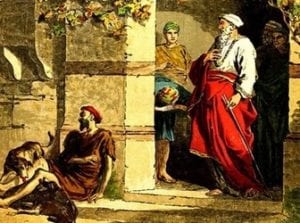
The Rich Man and Lazarus (Luke 16:19-31)
Part 1. The moral teaching of this parable:
Because the parable does not specifically say that the rich man did anything bad but he ended up in hell, nor does it specifically say that Lazarus did anything good but he ended up in heaven, some people hastily conclude that Jesus was teaching the ideology that wealth is sin and poverty is virtue. That is a big mistake. On the other hand, Jesus taught that indulging in luxury while ignoring beggars at your doorstep is grave sin which brings condemnation.
The rich man was damned to hell not because he had a lot of money, or because he wore rich clothes, or because every meal he had was a feast; the rich man was damned to hell because he ignored Lazarus who was poor, hungry, suffering and helpless. Lazarus was right there at his doorstep, and the rich man chose to ignore him.
Some people say: I am not very rich, so I don’t have to give to the poor. Ultimately, it does not matter how much money a person has. Doing nothing when Lazarus lies at our doorstep is committing a grave sin.
Part 2. The reversal of fate:
When he died, the rich man probably had a grand funeral with so many rich people in attendance. He was probably buried in a rich burial place. On the other hand, Lazarus, being so poor, most probably did not have a funeral at all, and if his corpse was buried at all, was buried in a potter’s field. But after death, their fate was reversed. The rich man has become needy and suffering, while Lazarus has come to heavenly delights.
Furthermore, the rich man now needs the very help from Lazarus, which in the previous life he had not given him. The big irony is that while on earth, the rich man had the ability to help Lazarus but did not. After he was damned to hell, no help can be given him. St. Paul warns us in this way: “Do not be deceived; God is not mocked, for whatever a man sows, that he will also reap.” (Galatians 6:7) While living on this earth, a person can sow either good or evil. After his death, a person will reap either damnation or eternal life.
Part 3. The demand for signs:
The rich man was making excuses for himself and for his brothers who were still living on earth. He reasoned that, if only he had known, he would have done things differently. He blames the lack of signs and warnings on earth. The way that Abraham answered refuted the rich man’s demand for a sign; Abraham said to the rich man: “They have Moses and the prophets.” (Luke 16:9)
The blame lies, not in the lack of warnings and signs, but in the unwillingness of people to listen to the warnings and signs that has already been given to them. The rich man is tormented in hell because he lived for self; he lived for self, not because he did not know that it was wrong, but because he did not choose to do what he knew to be right.